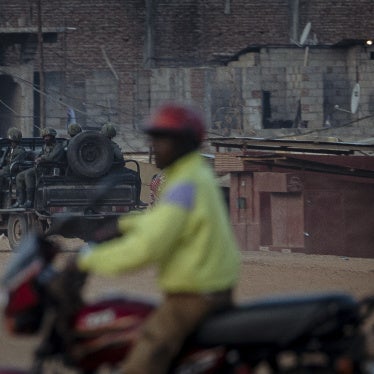Iran is prepared to send peacekeepers to London.
On August 11, the commander of Iran's Basij forces told the semi-official Fars News Agency that the "Ashura brigades of [the] Basij forces are ready to be dispatched to London as peacekeeping forces."
Yes, the Basij. The paramilitary force implicated in numerous rights violations against the Iranian people, especially during the violent crackdown on peaceful protesters following the disputed 2009 presidential election.
Tehran was quick to chastise British authorities. Faced with the scale of the disturbances, it is perfectly legitimate to raise questions about possible human rights abuses that may have occurred or may occur in response to events in London and elsewhere in the United Kingdom. Undoubtedly, the British authorities should make sure to respond in a measured and transparent way.
But Iran has adopted a quite different stance toward Syria, a longstanding ally in the region. Over the past four months human rights organizations have documented a brutal campaign of repression in which Syrian security forces have killed almost 2,000 protesters and bystanders, detained over 10,000 activists and protesters, and engaged in extra-judicial killings, torture and other serious rights violations against anti-government protesters.
Contrast the prevailing narrative about the Syrian government's serious rights abuses with the statements by Iran's supreme leader, Ali Khamenei, on June 30. Khamenei made a distinction between the demonstrations in Syria and those in other Arab countries and said that in Syria the "hand of America and Israel" renders the protests illegitimate. In one fell swoop Iran's highest-ranking authority reduced the legitimate demands of the Syrian people to nothing more than a veiled coup attempt by foreign powers.
Then on August 10, just before Iran offered to send its Basij to London, Alaeddin Boroujerdi, the head of the Iranian parliament's National Security and Foreign Policy Commission, told the secretary-general of the Arab League that the Arab world should stand up to the Americans and support the Syrian government.
Why does Tehran continually cheer the uprisings of the people of Egypt, Tunisia, Bahrain, Libya and Yemen, while turning a blind eye to the ruthless actions of the authorities in Damascus? Why not demonstrate the same eagerness to investigate human rights violations in Syria that it showed in its readiness to send a delegation to Britain to "study human rights violations" there?
On August 9, the deputy head of the Iranian parliament's National Security and Foreign Policy Commission urged the British government and London's embassy in Tehran to "provide the ground for the presence of the Iranian human rights rapporteurs in Britain and avoid making unreal excuses." A day later President Mahmoud Ahmadinejad called on British authorities "to correct their brutal behavior since such a brutal attitude is totally unacceptable."
On August 11, Britain's Charge d'Affaires in Tehran, Jane Marriott, responded in an open letter in which she highlighted her government's "standing invitation to all UN special rapporteurs." She urged "the Iranian government to extend a similar courtesy to the newly appointed UN special rapporteur for the Islamic Republic of Iran, Ahmed Shaheed, to enable him to address the international community's grave concerns about ongoing human rights violations within Iran."
The Iranian authorities have refused to allow UN special rapporteurs to visit the country since 2005. And they announced last month that they wouldn't cooperate or allow a visit by Shaheed, whose position was created by the UN Human Rights Council in March in response to Iran's worsening rights situation. His office issued a statement on August 3 appealing to the Iranian authorities to allow him into the country so he can fulfill "his mandate as required by the UN Human Rights Council."
The Iranians should heed their own advice to London, focus on taking concrete steps to improve their own atrocious human rights record and accept monitoring by human rights experts.
And while they're at it, they should urge their friends in Damascus to put an end to the bloodbath.
Faraz Sanei is a Middle East researcher at Human Rights Watch. Omar al-Issawi is the Middle East advocacy director at Human Rights Watch.






